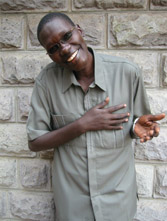The poem below was written by a man from Southern Sudan expressing his desire to have the Bible in his language. Sometimes, Bible translation is presented as something done where there are few believers. But in Africa, there are places where there has been a Gospel witness for decades and a growing church, but no Bible in the language of the people, their heart language. In such cases, believers long to have God’s word in a language they really understand. They know that the Bible is being translated into languages around them, and they wonder when it will be their turn. Put yourself in the place of those believers when you read this poem.
Far and near
It is said that you, God, speak!
How do you do that?
Is it in their tongues?
If it is truly so,
God, when will you speak in my tongue?
East and west, north and south,
The Creator speaks, it is said!
Not in the language as of birds;
But in other human tongues I cannot understand!
God, when will you speak in my tongue?
Children and grown-ups of other lands,
With their different tongues,
Know your voice.
In their tongues you speak a special message to them!
If you speak messages in different tongues,
God, when will you speak in my tongue?
 In the world around, we perceive you,
In the world around, we perceive you,
Yet your language is not clear.
We want to know you personally,
We want to hear you speak to us.
If you know all tongues,
God, when will you speak in my tongue?
We search you as a treasure.
Our eyes look on mountains, rivers,
Even in caves, forest and world around us.
Many voices are heard, confused we become,
If your voice is one, as of that of the Creator of all,
God, when will you speak in my tongue?
Oh! God, Creator of all people,
You who do not segregate,
Is it possible to hear you speak?
Can you speak in my tongue?
God, when will you speak in my tongue?
—James Lokuuda Kadanya
James speaks the Toposa language of South Sudan, which is spoken by more than a half million people. Today he is operating Salt and Light Outreach Ministries in South Sudan.
This post is re-blogged from The Seed Company Blog.


















